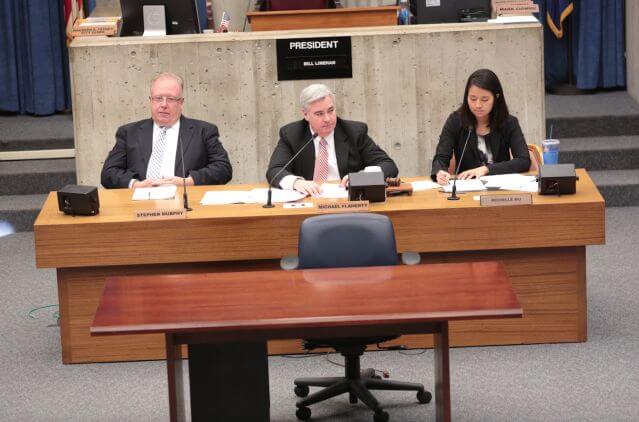A large group of activists marched from Plymouth to Boston over the course of three days, calling on the state to revoke Pilgrim Nuclear Power Plant’s license on Tuesday.
The plant, they say, is too dangerous to remain operational.
“It is impossible to make federal regulations for an evacuation plan in the areas that would be most impacted by a reactor meltdown,” Former Governor Mike Dukakis said. “At a time when we are trying to adopt alternative energy plans, there are lots of alternatives to archaic facilities that put the public at risk.” Dukakis started fighting the radiology emergency plans form both Pilgrim and Seabrook Nuclear Power Plant in Seabrook, New Hampshire, in the 1980s. During the shutdown of Pilgrim from 1986 to 1988. Dukakis butted heads with the NRC and opposed the emergency plans which he and his administration said would not protect the public in the event of a core meltdown. Senator Dan Wolf of Harwhich and the co-chair of the Legislature’s Joint Committee on Labor and Workforce Developmentsaid he was inspired by these efforts then and hope to further them now. “This plant has been operating for 43 years on a 40-year life, and is licensed for 60 years,” Wolfsaid. “To be using 1960s technology in 2015 is a failure on multiple levels.” In 2014, the Nuclear Regulatory Committee ranked Pilgrim in the nine worst performing nuclear power plants in the country when weighing in maintenance activities, spent fuel storage, safety and other risk factors. Located 38 miles southeast of the city, Boston is well within the range of exposure in the event of a meltdown, but Cape Cod would bare the brunt of the radiation.
Activists from Occupy Hingham, Cape Downwinders and the Pilgrim Coalition marched the 54-mile walk, which they called the “March For Our Children”to the Gardener Auditorium, calling on legislators to close the plant. Pilgrim shut down in January 2015 after two main transmission lines went down, but state officials said there were no safety hazards. It reopened to full capacity in late May after a 35-day shutdown. “The range of a potential reactor meltdown would blanket Cape Cod and the Greater Boston Area in radiation,” Beyond Nuclear group’s reactor specialist Paul Gunter said. “The potential accident dwarfsany evacuation plan and would be a man-made disaster to the scale of Fukushima.” The reactor in Pilgrim is a GE Mark I, the same type and age as the one in Fukushima that melted down in March 2011. But Pilgrim was still granted a renewed license in 2012, a move former Attorney General Martha Coakley opposed,after Entergy Corporation said they made $70 million in investments,replacing the fuel in the reactor and other equipment upgrades. There have been five power plant meltdowns in the last 34 years.
“This is not an energy policy issue — it’s a public safety issue,” Wolf said. “This is a failure of the EPA, which is sitting on a water discharge permit 20 years old, [and] the NRC who should not have approved the relicensing. The Massachusetts Emergency Management Safety Agency has said that there is no evacuation plan. We do not have a safe and rational approach.”














